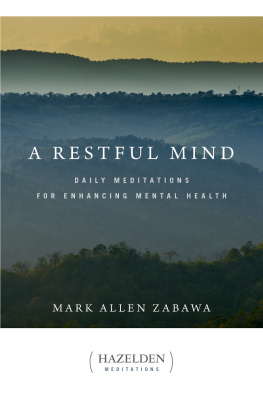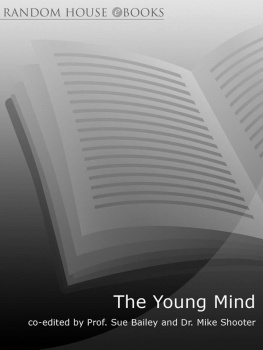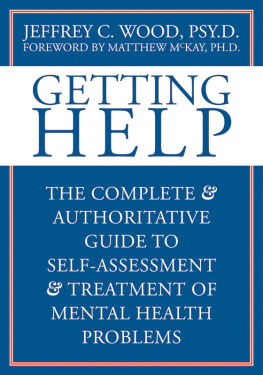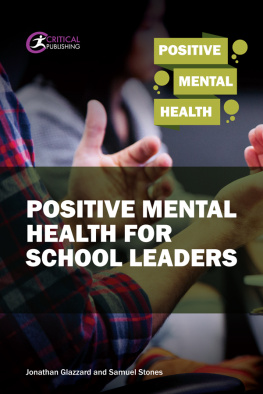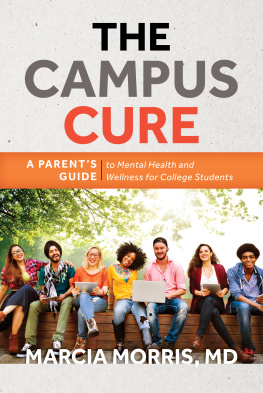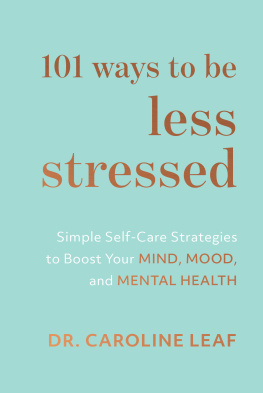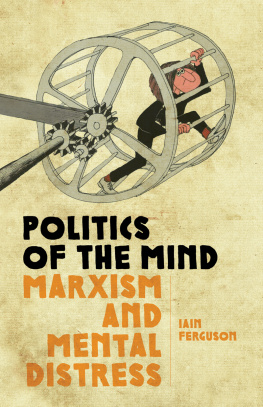All rights reserved. Published 2010
No part of this publication may be reproduced, stored in a retrieval system, or transmitted in any form or by any meanselectronic, mechanical, photocopying, recording, scanning, or otherwisewithout the express written permission of the publisher. Failure to comply with these terms may expose you to legal action and damages for copyright infringement.
A restful mind : daily meditations for enhancing mental health / Mark Allen Zabawa.
p. cm. (Hazelden meditations)
Includes index.
1. MeditationTherapeutic use. 2. Mental health. I. Title.
Typesetting by BookMobile Design and Publishing Services, Minneapolis, Minnesota.
On your journey ahead you will find yourself discovering limitations that you will grow to accept and possibilities far reaching your imagination. You will learn to accept and cope with your illness and realize that it does not define you as an individual, but rather it is one part of your true being.
FOREWORD
Recovery from mental illness is a process. It means taking care of ourselves each and every dayspiritually, emotionally, and physically. It means actively working to make change. It means making health and stability a priority. Although we each recover in our own way and on our own schedule, we all need help, and help comes in many forms.
Some of us go to therapy, for example. Many of us use prescription medication under the care of a doctor. Some of us attend regular support group meetings and work with mentors or sponsors. These and the many other ways we take care of ourselves are sometimes called the tools of recovery. We choose the ones that work best for us.
Millions of people in recovery from various illnesses have used a tool called bibliotherapy, which means reading to promote growth and understanding. A meditation book, like this one, is a common form of bibliotherapy. Because it can help with immediate issues, it works like an aspirin. Because it promotes psychological and spiritual growth, it works like a vitamin. Like other recovery tools, it works best when used on a regular basis.
A Restful Mind is a testament to experience, strength, and hope. Its daily meditations speak to all of us, regardless of our diagnosis. Topics include having setbacks, reducing anxiety, taking medication, asking for help, experiencing inpatient treatment, and being gentle with ourselves. Each one-page meditation has three parts: a reflection, a question to promote awareness, and a thought for the day. It helps to read each meditation more than once.
We read a meditation book like this one for many reasons. It can offer reassurance. It can help us feel normal. It can help us see where weve been and where we want to go. It can help us think more clearly and understand ourselves better. Though not every topic may seem to apply to our situation on any given day, we can still gain new insights and perspectives on mental illness from the ideas and experiences of others.
Like doing anything new, reading this book might feel strange at first. Be sure to give it a fair chance. Use it to start your day or end your day. Or carry it with you and read it when you have time. The idea is to make reading this book a daily ritual on your recovery journey. The goal is growth, support, and understanding.
Reading a meditation is like listening to someone who knows us and accepts us even though we have never met. With time, may A Restful Mind become a comfort, a companion, and a touchstone for you.
Tim Mc, author of Today I Will Do One Thing

JANUARY
JANUARY 1
A N EW Y EAR, A N EW B EGINNING
As the new year begins, we may be tempted to look back and focus on what we fell short of accomplishing, rather than looking at all that we have accomplished. We may sense failure for not completing every task we began. Or we may feel let down because some of what we wanted to have happen did not.
Let us be gentle with ourselves, however, for this is a new year and a new beginning. Let us look to our past for wisdom and guidance rather than failure and someone to blame. Let us look at what we achieved rather than at what failed to happen.
As we begin the new year, let us move forward with faith, courage, and the willingness to learn from each of our experiences. Let us focus on opportunities. But most of all, let us be true to ourselves and our recovery.
Am I stuck on last year or can I begin the new year today with faith and an open mind?
T HOUGHT FOR THE D AY
Today is a new beginning.

JANUARY 2
M ENTAL I LLNESS I S N OT A W EAKNESS
Mental illness is not a moral or psychological weakness. We are not weak-willed, defective, or underdeveloped. Mental illness is a biochemical illness that can affect anyone at any time.
As we continue our journey, it is important to remember that our illness has nothing to do with our character, personality, economic status, willingness, nor any other mythological cause.
Today, am I clear about who I am and the source of my illness?
T HOUGHT FOR THE D AY
I have an illness, not a weakness of the mind or soul.

JANUARY 3
S UCCESS
We often think that success is based on how much money we have or what we possess or our status in the community. But for those of us with a mental illness, success is more often defined by our ability to cope with our illness.
Many of us have turned what seemed an impossible situation into a new way of living. Some of us have returned to work. Most of us have gained a better understanding of ourselves. Many of us have achieved some goals and dreams.
On our journey we will have many opportunities for success. If today we have begun to manage our illness and take back our life, we have already tasted it.
Today, do I realize that success is already a part of my life?
T HOUGHT FOR THE D AY
I can succeed day after day by learning to cope with and manage my illness.

JANUARY 4
O UR L IVES C AN C HANGE

